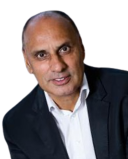Bias
Removing the Political Blindfold
How can we bring back more nuance in the lead-up to the elections?
Posted November 4, 2022 Reviewed by Tyler Woods
Key points
- With increasing political polarization in the U.S. and many other countries, voters are blinded by their political allegiance.
- We can work to counteract our confirmation bias in pursuit of more nuanced understandings of issues and policies.
- If those with the capacity to interrupt their biases do so now, they may be able to influence others to also challenge their own views.
It is no newsflash that the United States is witnessing a deepening partisanship and political polarisation. Many Americans only choose friends and partners who vote the same way as them, and Democrats and Republicans living in the same cities are segregated according to party support.
What’s more troubling, however, is how desperately people hold onto their views. Research shows that people will double down on their respective party beliefs even when they are presented with competing factual evidence.
This phenomenon, known as confirmation bias, is the selective processing of information based on whether it confirms or disproves pre-existing beliefs. It argues that we much more readily process conforming information and challenge or reject conflicting information.
When it comes to political support, this suggests that our party allegiances become a tightly-knotted blindfold, obscuring objective political understandings from view.
We see this selective attention in the United Kingdom, too. Our recent report showed that whether you voted to "Leave" or "Remain" in the 2016 Brexit referendum entirely alters voters’ evaluations of the source of the current cost-of-living crisis.
There are many problems with this—the greatest being that confirmation bias implicates the real outcomes of real issues. The November midterm elections in the United States will determine who holds power in Congress and the outcome of Joe Biden’s agenda, meaning votes will be cast without accurate understanding and policies will be introduced through a biased lens.
So how can we bring back objectivity?
1. Fight bias with bias
Unlike popular advice that fire shouldn’t be fought with fire, I’d argue that bias can be fought with (its opposite) bias. The falsification bias is the conscious search for factually-sound information which disproves your view. By actively employing this bias, not only do you adopt a mindset in which you are open to possibly being wrong, but you can begin to offset your confirmation bias by creating a more balanced picture of current issues and proposed policies.
2. Take time to consider the implications of your beliefs
We often hold concrete views on complex policies without understanding how they would impact people’s actual lives if enacted. Research into people who hold extreme views shows that when they are asked to explain the implications of policies they support or oppose, they more likely than not run into trouble. This self-awareness of their lack of understanding (and perhaps desire to comprehend it more) lessened the extremity of their support or opposition for the policies when they were asked again.
3. Challenge yourself and your peers
A good friend of mine likes to play the devil’s advocate by challenging our opinions with what she imagines the ‘other side’ might say in rebuttal. Admittedly, some will find this mildly frustrating. However, the pay-off is undeniable: If your opinions aren’t altered by the challenge it is likely they will have been strengthened. Either way, both results are arguably more nuanced endpoints.
I have often been asked what happens when only some of us, potentially the less-radicalised political supporters, do this work to interrupt our biases? It’s easy to imagine that we’d end up with two types of people: One which is actively unbiased and open to alternative perspectives based on reason, and another so far gone in their views that giving any credence to incorrectness is impossible.
In truth, as we are highly social beings, our openness to other perspectives often first comes from trusted sources changing our minds—be it a friend, family member, or fellow party member. This means that while the process of interrupting the biases of radical right or left-wing supporters might be slow, it is possible. More to the point, it is largely dependent on those with the capacity to consciously work against biases now, to do so in the hope that they can, in turn, one day encourage a more radicalised supporter in their sphere to think a bit differently.
With the midterms just around the corner, it is everyone’s responsibility to actively work to bring down their political blindfolds. While I don’t expect to see the number of mixed Democrat-Republican marriages go up any time soon, with any luck, Americans can at least head to the polls open-eyed and with a clearer perspective on what they want and why.


